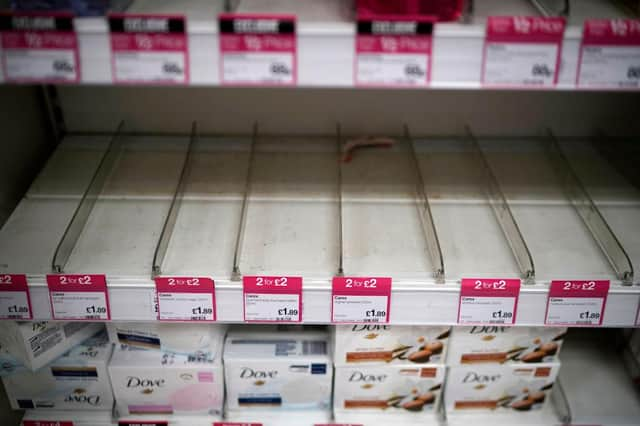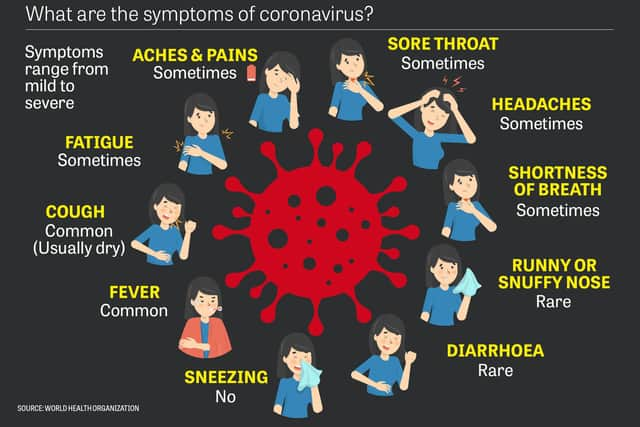Why are people panic buying toilet roll? is there a toilet roll shortage and which supermarkets are limiting supplies


Pasta, tinned goods, hand soap, long-life milk and toilet paper have all made the list of restricted items in some supermarkets, while others have placed a cap on the amount of any one product a customer can buy.
Reports of panic-buying have emerged from all over the world and toilet paper in particular was thrust into the spotlight after video of people fighting over rolls of it in an Australian supermarket went viral.
Here’s why people are bulk-buying toilet roll.


Why are people panic-buying toilet roll?
Advertisement
Hide AdAdvertisement
Hide AdNaturally, no-one believes that toilet paper will provide them with any kind of special protection against the coronavirus.
However, faced with the prospect of being directed to stay home for an extended period of time, no-one wants to run out of the essentials.
Consumer behaviour expert Dr Rohan Miller told the BBC that "I think people want to make sure they have some comforts in their lives if they're going to be shacked up with their family for a long time.”
This is why items like toilet roll find themselves on people’s panic-buy lists alongside the absolute necessities :"Toilet paper doesn't really matter - it's just so far down the survival list compared to other things like food or water - but it's just something people cling to as a minimum standard."
At a time when no-one knows exactly what to expect from this virus, preparations like this can act as a source of reassurance for some people, according to Professor Nikita Garg from the University of South Wales.
She told the BBC that, unlike with the natural disasters which many people are used to preparing for “people aren't certain as to how things are going to pan out, or how much worse it's going to get."
"They want to be prepared because it's the one thing they can do to get some sense of control."
Panic-buying also tends to provoke more panic-buying due to a psychological phenomenon known as FOMO syndrome - Fear Of Missing Out.
Advertisement
Hide AdAdvertisement
Hide AdProfessor Garg said that some will panic-buy because “They think if this person is buying it, if my neighbour is buying there's got to be a reason and I need to get in too
How are stores coping with the increased demand?
Tesco told The Scotsman that they are implementing a “common sense approach” to maintaining stock levels, with a list of items that are restricted to 2 per customer. The list includes long-life milk, pasta, tinned vegetables and toilet roll.
Aldi have also put a restriction in place, limiting customers to no more than four of any one product.
Aldi CEO Giles Hurley released a statement saying that “We have increased orders from our suppliers and our warehouses have sufficient stock to replenish all stores. This includes all of the essentials such as sanitary and baby products."
While he acknowledged that the surge in demand had led to some “gaps on shelves”, Hurley said “All of our stores receive daily deliveries, often multiple times a day. So if a certain product is not available when you visit, it will be replenished in the overwhelming majority of cases by the following day.”
Asda have taken similar measures, limiting customers to three of any single product. A statement on their website read as follows:
“We have plenty of products to go around, but we have a responsibility to do the right thing for our communities to help our customers look after their loved ones in a time of need. This is why, as of 18th March, customers will ONLY be able to buy up to three of any product across all food items, toiletries and cleaning products, so that all of our customers in stores and online have access to the products they and their families need.”
What about online shopping?
Amazon has said it will only accept shipments of cleaning equipment, medical supplies and household goods from suppliers at its warehouses for next three weeks to fill surging demand.The online retailer has been sold out of items like disinfecting wipes and toilet paper as the new coronavrius spreads and more people stay at home, shopping online.Amazon will still allow shipments of household items including baby products, groceries and pet supplies. The firm said the restrictions will last until April 5. It applies to large vendors and third-party sellers, who list items to sell on Amazon.com directly.
Advertisement
Hide AdAdvertisement
Hide AdShoppers can still order any items that have already shipped to Amazon warehouses before Tuesday.
Other websites have imposed “virtual queues" to prevent their sites from crashing under the increased demand.
The online demand for certain products has been so high that their resale value has risen as much as 5,000% in some cases – with 49p bottles of hand soap selling on eBay for £24.99.
Is bulk-buying supplies a good idea?
Public Health England has advised people to “plan ahead” in case they are forced to self-isolate.
However, as the self-isolation period would likely be a couple of weeks at most, you are unlikely to need hundreds of rolls of toilet paper.
The government’s chief scientific advisor, Sir Patrick Vance, has stated that there is “absolutely no reason” for people to be panic-buying at this time.
Boris Johnson echoed this, stating that “We’ve had no advice from the scientific advisers or medical officers that there’s any need for people to buy stuff in.”
He added that, rather than ensuring their own supplies and leaving others to go without “It is very important that everybody should behave responsibly and think about others."
Coronavirus: the facts
What is coronavirus?
Advertisement
Hide AdAdvertisement
Hide AdCOVID-19 is a respiratory illness that can affect lungs and airways. It is caused by a virus called coronavirus.
What caused coronavirus?
The outbreak started in Wuhan in China in December 2019 and it is thought that the virus, like others of its kind, has come from animals.
How is it spread?
As this is such a new illness, experts still aren’t sure how it is spread. But.similar viruses are spread in cough droplets. Therefore covering your nose and mouth when sneezing and coughing, and disposing of used tissues straight away is advised. Viruses like coronavirus cannot live outside the body for very long.
What are the symptoms?
The NHS states that the symptoms are: a dry cough, high temperature and shortness of breath - but these symptoms do not necessarily mean you have the illness. Look out for flu-like symptoms, such as aches and pains, nasal congestion, runny nose and a sore throat. It’s important to remember that some people may become infected but won’t develop any symptoms or feel unwell.
What precautions can be taken?
Washing your hands with soap and water thoroughly. The NHS also advises to cover your mouth and nose with a tissue or your sleeve (not your hands) when you cough or sneeze; put used tissues in the bin immediately and try to avoid close contact with people who are unwell. Also avoiding touching eyes, nose and mouth unless your hands are clean.
Government advice
As of Monday 16 March the government advised that everyone should be observing social distancing - avoiding unnecessary travel and working from home where possible. Anyone with a cough or cold symptoms now needs to self-isolate with their entire household for 14 days. The government has also advised against going to the pub, out for dinner or partaking in any socialising with large groups. This has caused a number of closures across the country. Schools will close from Friday 20 March for the foreseeable future and exams have been cancelled.
The over 70s or anyone who is vulnerable or living with an underlying illness are being asked to be extra careful and stay at home to self-isolate.
For more information on government advice, please check their website.
Should I avoid public places?
Advertisement
Hide AdAdvertisement
Hide AdThe advice now is to avoid public places and any non-essential travel. Travel abroad is also being advised against for the next 30 days at least, and many European countries have closed their borders.
What should I do if I feel unwell?
Don’t go to your GP but instead call NHS 111 or look online at the coronavirus service that can tell you if you need medical help and what to do next.
When to call NHS 111
NHS 111 should be used if you feel unwell with coronavirus symptoms, have been in a country with a high risk of coronavirus in the last 14 days or if you have been in close contact with someone with the virus.
Sources: World Health Organisation and NHS
